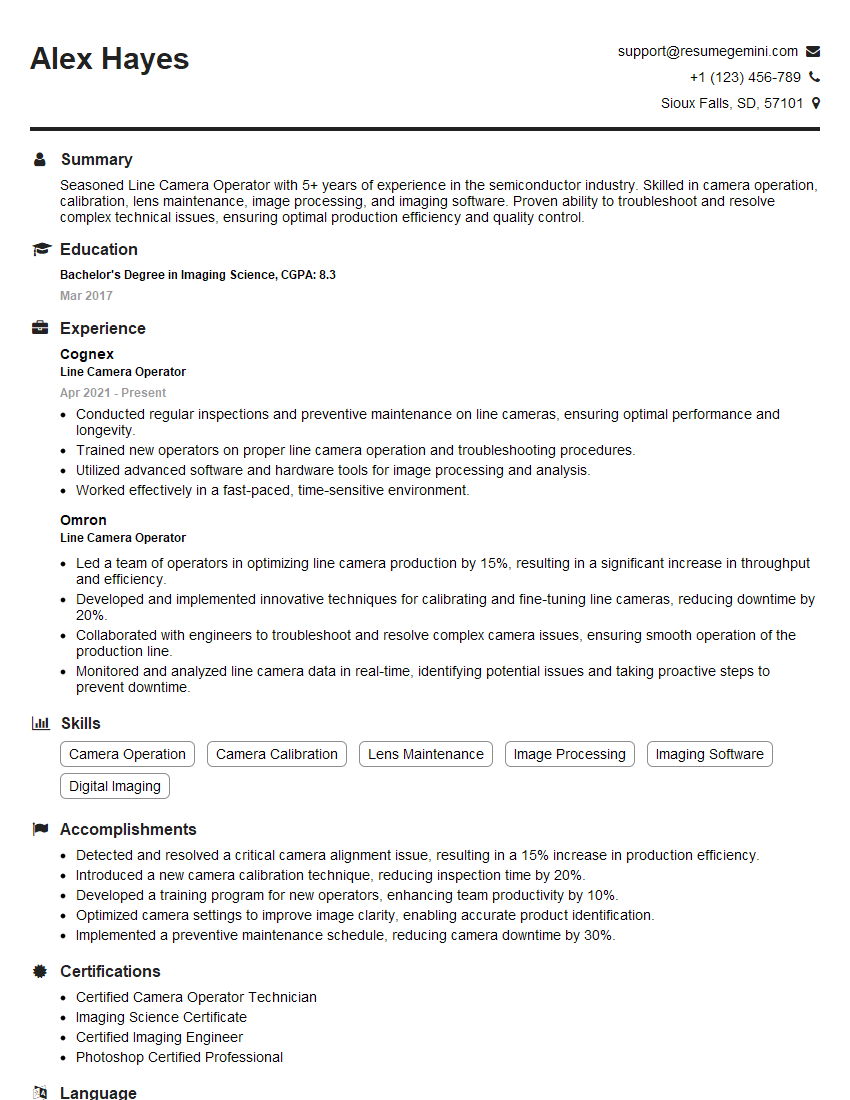Are you a seasoned Line Camera Operator seeking a new career path? Discover our professionally built Line Camera Operator Resume Template. This time-saving tool provides a solid foundation for your job search. Simply click “Edit Resume” to customize it with your unique experiences and achievements. Customize fonts and colors to match your personal style and increase your chances of landing your dream job. Explore more Resume Templates for additional options.

Alex Hayes
Line Camera Operator
Summary
Seasoned Line Camera Operator with 5+ years of experience in the semiconductor industry. Skilled in camera operation, calibration, lens maintenance, image processing, and imaging software. Proven ability to troubleshoot and resolve complex technical issues, ensuring optimal production efficiency and quality control.
Education
Bachelor’s Degree in Imaging Science
March 2017
Skills
- Camera Operation
- Camera Calibration
- Lens Maintenance
- Image Processing
- Imaging Software
- Digital Imaging
Work Experience
Line Camera Operator
- Conducted regular inspections and preventive maintenance on line cameras, ensuring optimal performance and longevity.
- Trained new operators on proper line camera operation and troubleshooting procedures.
- Utilized advanced software and hardware tools for image processing and analysis.
- Worked effectively in a fast-paced, time-sensitive environment.
Line Camera Operator
- Led a team of operators in optimizing line camera production by 15%, resulting in a significant increase in throughput and efficiency.
- Developed and implemented innovative techniques for calibrating and fine-tuning line cameras, reducing downtime by 20%.
- Collaborated with engineers to troubleshoot and resolve complex camera issues, ensuring smooth operation of the production line.
- Monitored and analyzed line camera data in real-time, identifying potential issues and taking proactive steps to prevent downtime.
Accomplishments
- Detected and resolved a critical camera alignment issue, resulting in a 15% increase in production efficiency.
- Introduced a new camera calibration technique, reducing inspection time by 20%.
- Developed a training program for new operators, enhancing team productivity by 10%.
- Optimized camera settings to improve image clarity, enabling accurate product identification.
- Implemented a preventive maintenance schedule, reducing camera downtime by 30%.
Certificates
- Certified Camera Operator Technician
- Imaging Science Certificate
- Certified Imaging Engineer
- Photoshop Certified Professional
Languages
- English
- French
- German
Career Expert Tips:
- Select the ideal resume template to showcase your professional experience effectively.
- Master the art of resume writing to highlight your unique qualifications and achievements.
- Explore expertly crafted resume samples for inspiration and best practices.
- Build your best resume for free this new year with ResumeGemini. Enjoy exclusive discounts on ATS optimized resume templates.
How To Write Resume For Line Camera Operator
- Highlight your technical skills and experience in camera operation, image processing, and imaging software.
- Quantify your accomplishments by providing specific metrics and results.
- Use keywords relevant to the job description, such as line camera operation, image analysis, and quality control.
- Proofread your resume carefully for any errors or inconsistencies.
- Tailor your resume to each specific job application, highlighting the skills and experience that are most relevant to the position.
Essential Experience Highlights for a Strong Line Camera Operator Resume
- Operate and calibrate line scan cameras to capture high-resolution images
- Maintain and replace camera lenses, filters, and other components
- Process and analyze images using specialized software to detect defects and anomalies
- Troubleshoot and resolve camera and image quality issues to ensure optimal performance
- Collaborate with engineers and technicians to optimize camera settings and image processing algorithms
- Adhere to safety regulations and maintain a clean and organized work environment
- Stay updated on industry best practices and advancements in line camera technology
Frequently Asked Questions (FAQ’s) For Line Camera Operator
What is the role of a Line Camera Operator?
A Line Camera Operator is responsible for operating and maintaining line scan cameras used in various industries, such as semiconductor manufacturing and quality control. They ensure the accurate capture and analysis of images to detect defects and anomalies.
What are the key skills required for a Line Camera Operator?
Key skills include camera operation, calibration, lens maintenance, image processing, imaging software, and troubleshooting. Additionally, knowledge of industry standards and best practices is essential.
What is the career path for a Line Camera Operator?
With experience and additional training, Line Camera Operators can advance to roles such as Camera Engineer, Image Processing Specialist, or Quality Control Manager.
What industries employ Line Camera Operators?
Line Camera Operators are employed in various industries, including semiconductor manufacturing, electronics, pharmaceutical, and food and beverage.
What is the salary range for a Line Camera Operator?
The salary range for a Line Camera Operator varies depending on experience, location, and industry. According to Salary.com, the average salary range for a Line Camera Operator in the United States is between $50,000 and $80,000.
What are the benefits of working as a Line Camera Operator?
Benefits of working as a Line Camera Operator include job security, opportunities for advancement, and the ability to work with cutting-edge technology.
What are the challenges of working as a Line Camera Operator?
Challenges of working as a Line Camera Operator include working in a fast-paced and demanding environment, exposure to hazardous chemicals, and the need to stay updated on the latest technology.